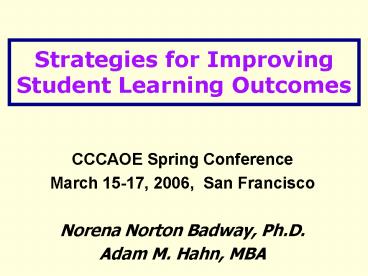Strategies for Improving Student Learning Outcomes - PowerPoint PPT Presentation
1 / 24
Title:
Strategies for Improving Student Learning Outcomes
Description:
Strategies for Improving. Student Learning Outcomes. CCCAOE Spring Conference ... Freshman Interest Group: Cyber Security, Juvenile Delinquency, Global Hunger ... – PowerPoint PPT presentation
Number of Views:83
Avg rating:3.0/5.0
Title: Strategies for Improving Student Learning Outcomes
1
Strategies for Improving Student Learning
Outcomes
- CCCAOE Spring Conference
- March 15-17, 2006, San Francisco
- Norena Norton Badway, Ph.D.
- Adam M. Hahn, MBA
2
Two decades of accountability
- has not considered
- our students preparation
- our students lives
- our students goals
- Accountability has not
- measured what really matters!
3
The Assessment Initiative asks
- while students were completing certificates and
degrees - what did they learn?
- how do you know?
- did faculty agree on expected outcomes?
- did faculty agree on evidence of learning?
- did faculty agree on improvement strategies?
4
The Assessment InitiativeA Faculty Opportunity
- Purposeful dialogue
- Faculty driven
- Flexible
- Incremental
- Focuses professional development
- Collegial
- Inclusive
- Learning centered
5
(No Transcript)
6
Step-by-Step
- Collectively author and collaboratively accept
Year 1 priorities gatekeeper courses and
critical outcome - Collectively author and collaboratively accept
assessment method(s) - Collectively author and collaboratively accept
evidence rubric and standards - Collectively gather and peer review evidence of
learning
7
Reflect on Student Learning
- Collegial
- Autopsy without judgment
- Involve adjuncts
- Identify trends in learning gaps
8
(No Transcript)
9
Collectively Set Improvement Strategies
- Grounded in a shared understanding of which
students learned (or failed to learn) expected
outcomes, faculty collaboratively identifies
strategies to improve student learning outcomes.
10
Research Based Strategies
- Contextualize content (hybrid courses)
- Link theory (basic skills or liberal arts) with
application (career-technical ed)
11
Contextual Teaching Learning (CTL)
- CTL is an educational process that aims to help
students see meaning in the academic material
they are studying by connecting academic (gen ed)
subjects with the context of their daily lives,
that is, with the context of their personal,
social, and cultural circumstances and career
goals.
12
CTL Components
- Active learning learn by doing
- Make connections between school and real life
contexts in business and community agencies - Perform significant work that matters and results
in a tangible or intangible product - Use creative and critical thinking by using logic
and evidence, making decisions
13
Infused Applications
- Consistent use of applications from a targeted
context - math algorithm used in engineering or
- engineering applications used in mathematics
course
14
Hybrid Course
- Liberal arts/ gen ed concepts taught THROUGH
career focus - course has subtitle that reflects context
- reading/ math assignments modified to reflect
context - students DO career activities
15
Hybrid Course Uses
- Reshape general education course with a career/
professional theme - (start a new career-tech program with all gen ed
courses) - Reshape developmental education with a career/
professional theme
16
Hybrid Course Examples
- Chemistry especially appropriate for fire science
majors Forensic Chemistry - English especially appropriate for Allied Health
majors Death and Dying, or Medicare Quandaries - Business Recordkeeping or Blueprint Reading for
developmental math
17
Step-By- Step
- What gap in student learning exists?
- How do you know that?
- How might contextualizing content be appropriate?
- How might contextualization improve student
learning outcomes? - Who should collaborate in this planning?
18
EXPERIMENT !
19
Linked Courses/ Learning Communities
- Thematic connections link theory and practice
- Linkages provide support for student learning
20
LC Uses
- Link introductory courses for a Freshman Interest
Group - Link general education courses with a liberal
arts theme - Link general education courses with a career/
professional them - Link developmental education courses with a
career/ professional theme - Link service learning or internship with a
liberal arts course
21
LC Examples
- Freshman Interest Group Cyber Security, Juvenile
Delinquency, Global Hunger - Developmental education Certified Nursing
Assistant, Early Childhood Reading Math,
Introduction to Building Trades - Service Learning linked with Social Issues
22
EXPERIMENT !
23
General Suggestions
- Plan to meet an identified learning gap,
following a cycle of inquiry about student
learning outcomes - Start small Contextualize one course or link two
courses - Collaborate for outcomes and pedagogy
24
For more information
- Norena Norton Badway, Ph.D.
- ltnbadway_at_pacific.edu OR badway_at_aol.comgt
- 209-601-7121
- Adam M. Hahn, MBA
- ltadam.m.hahn_at_gmail.comgt































